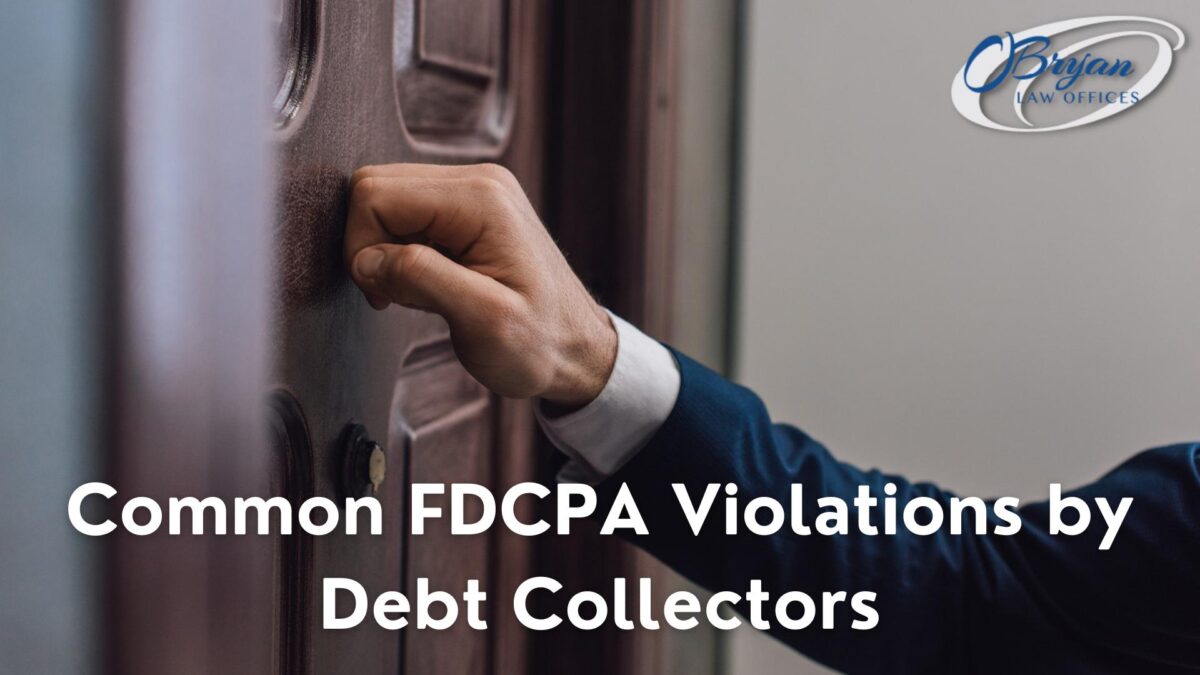The Fair Debt Collection Practices Act (FDCPA) protects consumers by prohibiting debt collectors from using unfair, deceptive, or abusive practices when attempting to collect debts. Common FDCPA violations include harassment and abuse, false or misleading statements, and engaging in unfair or unconscionable collection tactics. These violations can range from threatening harm and making excessive calls to misrepresenting debts or contacting third parties without permission.
Some frequent FDCPA violations include:
- Harassing calls made at inconvenient times or with abusive language
- Falsely claiming to be an attorney or threatening legal action that won’t happen
- Adding unauthorized fees or continuing collection efforts after bankruptcy
- Failing to provide proper debt validation or ignoring cease and desist letters
- Contacting consumers who are represented by an attorney
If you believe a debt collector has violated your rights under the FDCPA, it’s important to know you have options. You can file a complaint, dispute the debt, or even take legal action.
Contact us at O’Bryan Law Offices today at (502) 339-0222 to schedule your free consultation and learn more about your rights and how to protect yourself.
What Is the Fair Debt Collection Practices Act (FDCPA)?
The Fair Debt Collection Practices Act (FDCPA) is the federal law that dictates debt collection practices. President Jimmy Carter signed it into law to protect consumers and prohibit abusive, deceptive, or unfair debt collection practices. The FDCPA does not include business debts or cover the debt collection actions made by the original creditor or business you initially owed money to. Debt collectors included under the FDCPA are collection agencies, lawyers, and debt buyers.
The Consumer Financial Protection Bureau (CFPB) is the government agency that enforces the FDCPA. They are also responsible for investigating FDCPA violations and can help individuals resolve any problems with debt collectors who have violated this federal law.
Once the CFPB has received a complaint, they will tell the debt collector and work with both parties to find a solution. In addition to the CFPB, the Federal Trade Commission (FTC) is also responsible for regulating debt collectors’ actions and violations of the FDCPA.
While debt collectors must follow the FDCPA guidelines, they still often violate this federal law. In fact, the CFPB received almost 122,000 debt collection complaints in 2021.
What Are the Most Common FDCPA Violations by Debt Collectors?

While debt collectors are required to follow the Fair Debt Collection Practices Act (FDCPA), many still engage in illegal tactics to collect debts. The FDCPA sets clear rules on how debt collectors can communicate, what they can say, and when they can contact you. If a debt collector uses any of the following actions, they are committing common violations of the FDCPA.
Harassment and Abuse
Debt collectors cannot harass or abuse you in any way. This includes:
- Threatening physical harm, property damage, or harm to your reputation
- Using obscene, profane language, or abusive language during calls or letters
- Publicly disclosing your debt, such as publishing a list of debtors
- Making excessive or repeated phone calls intended to annoy or harass
- Calling at inconvenient times, such as before 8 a.m. or after 9 p.m., or calling your workplace if they know it’s prohibited
False or Misleading Representations
Debt collection agencies cannot mislead you about your debt or their authority. Any misrepresentation or attempt to make false statements about the debt or their role is a violation of the FDCPA. This includes:
- Falsely stating the amount or legal status of your debt
- Pretending to be an attorney, government official, or law enforcement
- Threatening actions they cannot legally take, like arrest or seizure of property
- Failing to clearly disclose they are debt collectors when contacting you
Unfair or Unconscionable Practices
Certain unfair practices are prohibited, including:
- Adding unauthorized fees or charges not allowed by law or contract
- Contacting third parties about your debt without your consent or a court order, except to specific exceptions like your spouse or attorney
- Failing to send a written debt validation notice that explains the amount owed, the creditor’s name, and your rights to dispute the debt
- Continuing to contact you after you send a written cease and desist letter
- Attempting to collect debts after you have filed for bankruptcy
Continuing to Attempt Debt Collection on Debts You Don’t Owe
Debt collectors sometimes repeatedly contact individuals for debts that have already been paid, discharged in bankruptcy, or never owed. This harassment can feel overwhelming and difficult to stop. Common reasons for such wrongful collection efforts include:
- You were misidentified as the debtor.
- You are a victim of identity theft.
- The debt has been fully paid.
- The debt was discharged due to bankruptcy.
If you’re being contacted about a debt you don’t owe, check your credit report immediately and report errors to the credit reporting agencies.
Threats Over Time-Barred Debts
Debt collectors may not legally sue or threaten to sue you for debts that are past the statute of limitations in your state. Attempts to collect on these time-barred debts or threats of lawsuits are common FDCPA violations and grounds for legal action.
If you are experiencing any of these violations, it’s important to document all communication and seek legal advice to protect your rights.
Other Common Violations
Debt collectors must also respect these rules:
- They cannot contact you directly if they know you are represented by an attorney
- They must report disputed debts as disputed to credit reporting agencies
If you are receiving calls or letters that violate any of these rules, it’s important to take action. Check your credit reports for errors, keep records of all communication, and contact an experienced attorney to protect your rights.
For personalized guidance and legal support, contact us at O’Bryan Law Offices by calling (502) 339-0222 to schedule your free consultation and take the first step toward protecting your rights.
What Are Your Options if a Debt Collector Violates the FDCPA?
The Fair Debt Collection Practices Act was enacted to protect consumers from harassing debt collector calls and other threatening or abusive debt collection actions. If debt collectors are harassing you, you have options available to report them for FDCPA violations.

File an FDCPA Violation Lawsuit in State or Small Claims Court
One option consumers can pursue against debt collectors violating the FDCPA is to sue them in state court. For this lawsuit, you must provide evidence showing the debt collector violated the FDCPA. A successful case may result in $1,000 in statutory damages and more depending on if you suffered harm.
If you’re considering taking legal action against harassing debt collectors, contact the attorneys at the O’Bryan Law Offices. It’s important to note that to file a lawsuit against a debt collector, the FDCPA claim must be made within one year from the date the violation occurs.
Individuals that don’t have the time for a state court lawsuit can also file legal action in small claims court. This legal process doesn’t require an attorney and allows individuals to argue their case in one short court hearing. Once you’ve filed the court document, your hearing is usually held within two months. The judge will either give you their ruling during the hearing or mail you the verdict later. Small claims court cases have one disadvantage: they limit the amount of damages you can recover.
Report Them to the Federal Trade Commission
As mentioned above, the Consumer Financial Protection Bureau (CFPB) and the Federal Trade Commission (FTC) monitor debt collectors’ actions and ensure they are not violating the FDCPA. Anyone who believes a debt collector violates the FDCPA can contact the Federal Trade Commission and .
If you wish to submit a complaint with the Consumer Financial Protection Bureau, you can submit an online form on their website.
Report Them to Your State Attorney General
A debt collector that is in violation of the FDCPA may also be in violation of state laws. You can contact the state Attorney General’s office to learn about pursuing a lawsuit against the debt collector. It’s essential to report a debt collector that is violating the FDCPA because if they receive enough complaints about a particular debt collector, they may pursue a lawsuit against them on the state’s behalf.
Use This to Your Advantage in Settlement Negotiations with an Unfair Debt Collection Attorney
When borrowers are trying to settle their debts and the debt collector violates the FDCPA, they can use this as leverage when trying to settle the debt. Many debt collectors know how expensive an FDCPA lawsuit is and that they often result in judgments against them.
If you believe a debt collector has violated the FDCPA, contact the experienced attorneys at the O’Bryan Law Offices. We will evaluate how strong of a case you have and gather evidence proving the debt collector violated the act. Evidence that can strengthen your case is records of multiple telephone calls, copies of letters, testimony from witnesses, and more. The more evidence you have, the stronger your lawsuit will be.
What Damages Can You Recover Under the FDCPA in Kentucky?
If you successfully sue a debt collector for violating the FDCPA in Kentucky, you may be entitled to recover statutory damages of up to $1,000. This amount is established by federal law and does not require proof of actual financial loss. In addition to statutory damages, you can also seek compensation for actual damages, such as emotional distress, lost wages, or other economic harm caused by the debt collector’s misconduct.
Kentucky law also allows for the recovery of attorney’s fees and court costs in FDCPA cases, helping to reduce the financial burden of pursuing legal action. These consumer protection measures make the FDCPA an important tool for Kentucky residents to hold debt collectors accountable and safeguard their rights against abusive collection tactics.
If you believe a debt collector has violated your rights under the FDCPA, it’s crucial to consult with an experienced Louisville attorney who understands both federal and state laws and can guide you through the process of seeking damages and justice.
Contact O’Bryan Law Offices – Experienced FDCPA Violations Lawyer
Struggling to pay off debt is stressful enough without the constant hounding of debt collectors reminding you of the money owed. Debt collectors’ strategies often violate the FDCPA even though they’re governed by the Federal Trade Commission (FTC) and the Consumer Financial Protection Bureau (CFPB). If you believe that a debt collector is violating the FDCPA, you have legal options to take action against the debt collector.
To learn more about filing a lawsuit against the debt collector or the other options available that you can take against a harassing debt collector, contact the O’Bryan Law Offices. Our experienced Louisville bankruptcy attorneys will evaluate your case to determine the legal recourse.
Schedule a free consultation with the attorneys at the O’Bryan Law Offices by calling (502) 339-0222 today.



